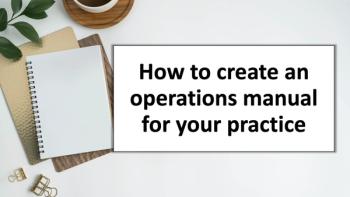
The Administrator’s Desk: No More ‘That’s Not My Job’
Obtain staff buy-in for a teamwork approach.
If you stop by Ohlbaum & Waterman Eye Associates after hours, you might just catch Denys Meade scrubbing toilets. As practice administrator of the New Hartford, N.Y.-based optometry group, Meade says showing her staff she’s a member of the team is an integral part of her management philosophy. “I don’t ask my staff to do anything that I myself wouldn’t do,” she says. “I stay late, come in early, help with logging of the medical records, make the coffee. I’ll do whatever is needed.”
Why? Meade recognizes the power of positive office culture. Employees who embrace a teamwork approach, she notes, are more likely to share an emotional commitment to the practice. That, in turn, motivates them to perform. Yet such synergy remains an elusive goal at many practices.
“There is an inherent conflict in all medical care facilities,” argues Richard Blanchette, executive director of the Professional Association of Health Care Office Management. “The clinical segment wants to provide the optimal medical care to all patients without constraint. The clerical segment wants to be efficient, document the care, and abide by the plethora of regulations. It is critical that the two forces recognize and respect the needs of the other.”
Make pinch-hitting a policy
According to practice management veteran Donita Toth, of Bellevue, Ohio, convincing staff to collaborate is best achieved through clear communication. “The key is having job descriptions that specifically state, ‘You will assist your coworkers when you have the opportunity or if those things are asked of you,’” she says. That means cross-training staff to perform multiple job responsibilities. It also means sending clear signals that you will not tolerate a “that’s not my job” attitude. “If you have 15 minutes free, you can make a world of difference to the people in filing who are about to pull their hair out,” says Toth. “Once employees start working together, everyone becomes much happier.” They also learn to empathize with coworkers and become more valuable to the practice because they learn a new skill.
Take the heat
To earn their trust, administrators must also be willing to act as advocates for their team. “I tell [my staff] that my job is to make their life easier,” says Meade. “If they’re having a personal or professional problem, they need to come to me. If there’s anything we can do to make their job a little better, we’ll do it.” When issues arise between clerical staff and the physicians, Meade also tells her employees to put the blame on her. “I take the heat for them,” she says.
Give them a voice
It’s equally important, of course, that employees feel heard. To that end, Meade builds time into weekly meetings for “open discussion,” in which all members of the staff are free to vent or share new ideas. “I don’t say anything. I just let them talk,” she says. When new policies are implemented, Meade lets them know it’s not set in stone. “I tell them this is a trial and they’re motivated to try it because they feel they have input,” she says.
Rewarding team players
Bonuses and performance incentives can also encourage staff to work together for the greater good of the practice - if they’re handled correctly. While individual bonuses can create a competitive environment or breed resentment, group rewards help practices achieve multiple goals.
For her part, Meade uses a monthly bonus system that rewards the entire staff for gains over year-ago performance. “That gets them working together to see if they can make [the] bonus,” she says. “It encourages them to focus on making appointments correctly, getting insurance authorizations, and making sure billing gets done correctly and in a timely manner.”
Toth, meanwhile, did away with sick-day benefits altogether, opting instead for a perfect attendance bonus of $200 every 6 months. By design, the money is distributed just before school started and just after the holidays, when working parents need extra cash the most. “I found that when I offered sick time as a benefit people took full advantage of that,” says Toth. “They assumed it was really a day off for mental health.” By rewarding attendance instead, employees began to appreciate their role as part of the team. “They started getting it - that it’s hard on everyone else when they’re gone,” Toth says. “Accountability makes a big difference.”
From the top
According to Toth, however, the success of any effort to cultivate team players hinges largely on the rapport between upper management and the staff. “The biggest influence for building teamwork comes from the physicians and how they treat their staff,” she says. “If there’s an atmosphere of disorganization or the physicians rule with a heavy hand, it gets to be competitive as to who is in favor with the physicians this week and who is not.”
Meade agrees: “I have worked in practices where the doctors didn’t care [about the staff] and it showed in the employees - in their attitudes toward the practice and each other.” The physicians at her current practice go out of their way to make clinical and clerical staff feel appreciated, she notes. “If I myself, along with the doctors, really care about the staff, they feel that. It makes them feel important and want to do whatever they can to help the practice.”
Shelly K. Schwartz is a freelance writer in Maplewood, N.J., who has covered personal finance, technology, and healthcare for 12 years. Her work has appeared on
This article originally appeared in the September 2007 issue of Physicians Practice.
Newsletter
Optimize your practice with the Physicians Practice newsletter, offering management pearls, leadership tips, and business strategies tailored for practice administrators and physicians of any specialty.








